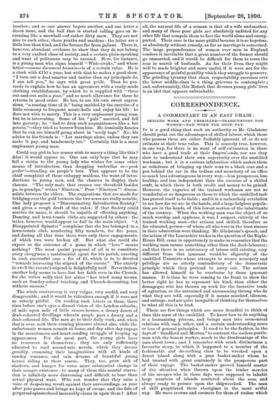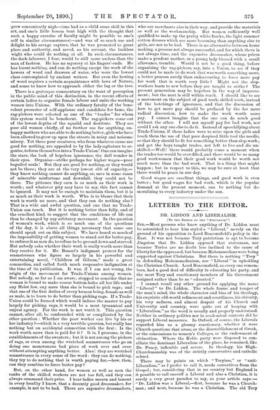CORRESPONDENCE.
who possess them are either foolishly ignorant of, or do not estimate at their true value. This is scarcely true, however, in one way, for there is no want of self-estimation in those who have a good trade at their fingers'-ends, nor are they slow to understand their own superiority over the unskilled workman ; but it is a curious infatuation which makes them so solicitous of bringing up their sons to a black coat and a, pen behind the ear in the tedium and monotony of an office so much less advantageous in every way,—less prosperous, less healthy, and less independent than the exercise of a skilled craft, in which there is both credit and money to be gained. However, the vagaries of the trained workman are not so wonderful or so dangerous as those to which the unskilled mob has proved itself to be liable ; and it is a melancholy revelation to see how far we are in the hands, and a large helpless popula- tion are in the hands, of this lowest section of the inhabitants of the country. When the working man was the object of so much worship and applause, it was, I suspect, entirely of the trained working man—the artisan and skilled, therefore so far educated, person—of whom all who were in the least sincere in their admiration were thinking. Mr. Gladstone's speech, and the action of the Lancashire trades in the question of the Eight- Hours Bill, came in opportunely to make us remember that the working man means something other than the dock-labourer; and that there is an aristocracy of labour still existing, very different from that ignorant would-be oligarchy of the unskilled Unionists whose attempts to secure monopoly and privilege are so utterly contradictory of the democratic- principle which they pretend to carry out. The artisan has allowed himself to be overborne by those ignorant. masses. It is time he were coming to the front to show the better right he has to represent his kind, than either the demagogue who has thrown up work for the lucrative trade of agitation, or the untrained and unreasoning throng who do what they are told, especially if it means mischief, idleness, and outrage, and are quite incapable of thinking for themselves- to what all this is to lead.
There are few things which are more dreadful to think of than this mass of the unskilled. To know how to do anything is a humanising process, and brings men into economical relations with each other, and a certain understanding more or less of general principles. It used to be the fashion, in the days of " Sandford and Merton," to contrast the useless gentle- man with the honest worker, much to the disadvantage of the man about town ; and I remember with much distinctness a favourite story, in which it happened to a member of the fashionable and do-nothing class to be wrecked upon a desert island along with a poor basket-maker whom he had treated with great contumely in the prosperous part of their voyage. The basket-maker proved himself master of the situation when thrown upon the tender mercies of the savages who in those days were supposed to inhabit large numbers of islands scattered about the seas, and always ready to pounce upon the shipwrecked. The man of skill propitiated these aborigines in the most artful way. He wove crowns and coronets for them of rashes which grew conveniently nigh—(one bad as a child some skill in this art, and one's little bosom beat high with the thought that such a happy exercise of faculty might be possible to one's self in similar circumstances)—and was of so much use and delight to his savage captors, that he was promoted to great place and authority, and saved, as his servant, the luckless wight who could do nothing at all. In such circumstances, the dock-labourer, I fear, would be still more useless than the man of fashion. He has no mystery at his fingers'-ends. He has learnt nothing, and can do nothing except the work of the hewers of wood and drawers of water, who were the lowest class contemplated by ancient writers. But even the hewing of wood requires a certain acquaintance with laws of Nature, and sense to know how to approach either the log or the tree. There is a grotesque commentary on the want of perception in the public mind of this distinction, in the recent efforts of certain ladies to organise female labour and unite the working women into Unions. With the ordinary fatuity of the bene- volent promoter of self-applause and candidate for fame, the rag-pickers were selected as one of the " trades " for whom this system would be beneficent. The rag-pickers come out of the lowest depths of the squalid and destitute. They are poor old women chiefly, of no further use for anything, un- happy mothers who are able to do nothing better, girls who have been allowed to grow up upon the streets in noisy and noisome misery. Yet these poor creatures, who from whatever cause are good for nothing, are appealed to by the lady-agitators to or- ganise, to form themselves into a Trade-Union! One can imagine the stare, the look of hopeless ignorance, the dull wonder in their eyes. Organise—strike perhaps for higher wages—poor beguiled souls ! But they are good for nothing, or they would not be there ; they are at the very lowest ebb of capacity,— they know nothing, cannot do anything, or, save in some cases of miserable misfortune and downfall, they could not be there. The pittance they earn is as much as their work is worth ; and whatever pity may have to say, this fact cannot be ignored. It may not be enough to maintain them, but it is as much as their work is worth. Who is to blame that their work is worth no more, and that they can do nothing else ? That is a wide and awful question, and one that no Trade- Union can touch. But it is nothing better than folly, and of the cruellest kind, to suggest that the conditions of life can thus be changed by any arbitrary movement. In the question of women's work, which is so much one of the questions of the day, it is above all things necessary that some one should speak out on this subject. We have heard so much of the impossibility of getting women to stand out for better pay, to enforce it as men do, to refuse to be ground down and starved. Bat nobody asks whether their work is really worth more than they receive for it. Mr. Besant's indignant protest for the seamstresses who figure so largely in his powerful and entertaining novel, "Children of Gibeon," made a great commotion, and called forth much responsive indignation at the time of its publication. It was, if I am not wrong, the origin of the movement for Trade-Unions among women. But nobody, so far as I am aware, stopped to consider that no woman is bound to make coarse button-holes all her life under any Helot law, any more than she is bound to pick rags ; and that one of the first duties of every human being, female as well as male, is to learn to do better than picking rags. If a Trade- Union could be formed which would induce the master to pay largely for picking raga, it would be a most tyrannical and unjust agency. For the work is not worth it. This question cannot, after all, be confounded with or complicated by the -other question : Whether the poor worker can live by his or her industry ?—which is a very terrible question, but really has nothing but an accidental connection with the first : Is the work worth more than is paid for it ? It is, I presume, in the establishments of the sweaters ; but it is not among the pickers of rags, or even among the wretched seamstresses who go on doing one monotonous bad piece of work over and over, without attempting anything better. Alas ! they are wretched seamstresses in every sense of the word : they can do nothing, they try to do nothing that is worth paying for,—how, then, can they combine to force better pay?
But, on the other hand, for women as well as men the ranks of the skilled workers are not too full, and they can always command their price. I hear ladies mourn and lament in every locality I know, that a decently good dressmaker, for example,is not to be had. There are expensive dressmakers,
who are merchants also in their way, and provide the materials as well as the workmanship. But women sufficiently well qualified to make up the pretty white frocks, the light summer cotton dresses which are more becoming than anything else to girls, are not to be had. There is no alternative between home making, a process not always successful, and for which there is not always time, and the expensive dressmaker, whose prices make a prudent mother, or a young lady blessed with a small allowance, tremble. Would it not be a good thing, before organising the rag-pickers, say, into a Union, to see if they could not be made to do work that was worth something more, a better process surely than endeavouring to force more pay for work that is worth very little ? Might not the slop. workers learn to sew before they are taught to strike P The present generation may be hopeless in the way of improve- meat; but the next is still within reach. I should like to see a movement on the subject of good work, skilled work, instead of the botchings of ignorance, and that the discussion of how to get more pay should be prefaced by the far more radical discussion, how to make the work worth more pay. I cannot imagine that the one can do much good without the other. I will not myself pay for bad work, nor could I ask any one else to do it. Instead of speechifying about Trade-Unions, if these ladies were to seize upon the girls and teach them the use of that poor despised little tool the needle, so that they should be fit for something better than slop-work ; and get the boys taught trades, not left to live and die un- skilled.—Well ! there would probably come a moment when the trades too would be over-filled, and there would be so many good workwomen that their good work would be worth not much more than the bad work. That is a thing that might happen; but in respect to this, we may be sure at least that there would be peace in our day.
Good wages are excellent things, and good work is even better ; but good wages for bad work, which is the popular demand at the present moment, can be nothing but de- moralising to every industry under the sun.



































 Previous page
Previous page